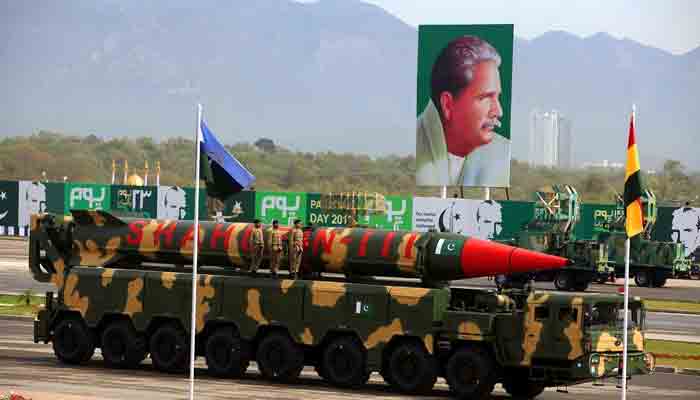Proliferation of nukes: Pakistan studying joint pledge by five N-states
Pakistan’s nuclear capability is in accordance with its requirements and Islamabad has throughout been opposing its proliferation
ISLAMABAD: Pakistan is studying the joint pledge expressed by the United States of America, China, Russia, the United Kingdom and France to prevent spread of nuclear weapons.
Pakistan has been adhering to its nuclear doctrine of maintaining a credible minimum deterrence. Well-placed sources of the Foreign Ministry while interacting with The News here on Saturday maintained that the pledge shown by the five declared nuclear powers is significant. Pakistan’s nuclear capability is in accordance with its requirements and Islamabad has throughout been opposing its proliferation.
Foreign Secretary Sohail Mahmood didn’t respond to the query about Pakistan’s official position about the statement issued at the United Nations headquarters early this week. Interestingly, Pakistan’s permanent representative for the world body Munir Akram was not present in New York during the nuclear P-Five meeting as he was in Islamabad and couldn’t gather the developments around the resolve of the five nuclear capable countries.
In a rare joint statement, the five key nuclear-armed nations said early this week that a nuclear war cannot be won and must never be fought while vowing to prevent the spread of atomic weapons.
The sources reminded that Pakistan being a responsible nuclear weapon state has been following well set-out policy on the subject that is widely appreciated by the world. It is in line with the needs of the country, the sources said. The diplomatic observers are of the view that the joint statement has conspicuous significance in the wake of mounting tension between Russia and Ukraine and hostile posturing by relevant states on Taiwan.
It is understood that the joint statement has no relevance with the affairs of South Asia. In the statement, the five world powers underlined their desire to work with all states to create a security environment conducive to progress on disarmament with the ultimate goal of a world without nuclear weapons with “undiminished” security for all.
“We intend to continue seeking bilateral and multilateral diplomatic approaches to avoid military confrontations, strengthen stability and predictability, increase mutual understanding and confidence, and prevent an arms race that would benefit none and endanger all,” the joint statement had said.
-
 Inside Cardi B's Real Feelings Related To Stefon Diggs Split Post One Year Of Romance
Inside Cardi B's Real Feelings Related To Stefon Diggs Split Post One Year Of Romance -
 Former Sri Lankan Intelligence Chief Arrested Over 2019 Easter Bombings
Former Sri Lankan Intelligence Chief Arrested Over 2019 Easter Bombings -
 Kristen Bell Shares One Rule For 'SAG' Awards Ceremony That She Will Ditch This Time: 'Happy And Fun'
Kristen Bell Shares One Rule For 'SAG' Awards Ceremony That She Will Ditch This Time: 'Happy And Fun' -
 Woman Suing Meta Platforms, YouTube Over Social Media Addiction Sticks To Claims After Trial
Woman Suing Meta Platforms, YouTube Over Social Media Addiction Sticks To Claims After Trial -
 Shakira Applauded For 'gracious' Behaviour By Fans As She Blends Work With Family Downtime
Shakira Applauded For 'gracious' Behaviour By Fans As She Blends Work With Family Downtime -
 Prince William Hits The Roof With The Andrew Saga Bleeding Into Earthshot
Prince William Hits The Roof With The Andrew Saga Bleeding Into Earthshot -
 Mexico’s President Considers Legal Action Over Elon Musk Cartel Remark
Mexico’s President Considers Legal Action Over Elon Musk Cartel Remark -
 HBO Gives Major Update About 'Industry' Season Five And Show's End
HBO Gives Major Update About 'Industry' Season Five And Show's End -
 Donnie Wahlberg Responds To 'Boston Blue' Backlash: 'Nobody Was More Disappointed Than Me'
Donnie Wahlberg Responds To 'Boston Blue' Backlash: 'Nobody Was More Disappointed Than Me' -
 Jennifer Garner Gets Emotional Over Humble Career Start: 'It Makes Me Want To Cry'
Jennifer Garner Gets Emotional Over Humble Career Start: 'It Makes Me Want To Cry' -
 Princess Beatrice Told An Acquaintance That She ‘likes’ Jeffrey Epstein: Grim Verdict Drops
Princess Beatrice Told An Acquaintance That She ‘likes’ Jeffrey Epstein: Grim Verdict Drops -
 Late Katherine Short's Neighbours Give Insights Into Her 'peace Loving' Personality Post Suicide
Late Katherine Short's Neighbours Give Insights Into Her 'peace Loving' Personality Post Suicide -
 Fresh Details Of King Charles, Queen Camilla's US Visit Emerge Amid Andrew Investigation
Fresh Details Of King Charles, Queen Camilla's US Visit Emerge Amid Andrew Investigation -
 Iran 'set To Buy' Chinese Carrier-killer Missiles As US Forces Gather In Region
Iran 'set To Buy' Chinese Carrier-killer Missiles As US Forces Gather In Region -
 Prince Harry And Meghan Unlikely To Meet Royals In Jordan
Prince Harry And Meghan Unlikely To Meet Royals In Jordan -
 Hero Fiennes Tiffin Shares Life-changing Advice He Received From Henry Cavill
Hero Fiennes Tiffin Shares Life-changing Advice He Received From Henry Cavill




